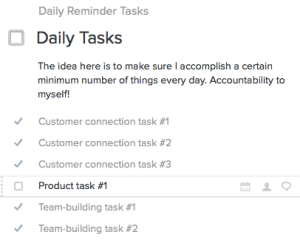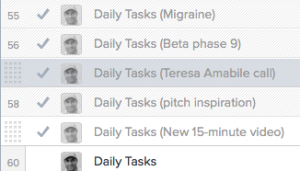How I perform as a sole startup founder
Sole Founder
It’s like a dirty word, and for good reason. Many experts caution against it, and the statistics don’t lie: sole founders are less likely to build successful companies, and even when they do, those companies are less likely to be large successes. There are a few key reasons for this, but two stand out for me: multiple founders can support each other emotionally when things are down, and starting a company is too much work for one person alone.
I’m open to growing my founding team. Disqovery has a powerful mission, and whoever joins needs to eat, sleep, and bleed that mission; however, I’m not putting our product development, market validation, and fundraising efforts on hold in the meantime.
Some people I talk to are surprised by how much I get done in my role as Founder & CEO of Disqovery. It has taken work to get this level of self-efficacy, and I want to share some advice that could help other founders and potential founders out there.
I had to make a change
When you have a team, or even a cofounder, you have a system of mutual accountability. If a job doesn’t get done, someone will be there giving you a hard time about it. Loving your company is great motivation, but for most people not letting someone down is even stronger.
About a year ago, things were not going so well. On an average day even though I felt like I was doing a lot, by the end of the week it was clear that Disqovery had not made much progress as a business. My hours were long and odd, and I had basically no time for myself or others. I enjoy project management, and clearly the time had come to project manage myself.
First, I had to figure out what I needed
I had a set of goals in mind for whatever system I was going to design:

It has to be lightweight, and maybe even fun. In the spirit of Disqovery, I had to make a system that I would be engaged with myself. If it was hard to use or tedious I know I wouldn’t stick with it. Celebrating the wins, however small, has always been important to me, and I wanted to build that in.
It has to keep me consistently productive. Startups are a marathon. Every day doesn’t have to be amazing, but every day needs to have meaningful progress. I need to be accountable to myself by being accountable to my system. I also wanted to define an ’end’ of my day, so I can go to sleep, spend time with family, or just relax. Founders need to do enough hard work every day - not too little, but also not too much.
Founders need to do enough hard work every day - not too little, but also not too much. #startups #founders https://t.co/hD1foEUcjD
— Varun Mehta (@smartperson) June 26, 2016
It has to be unforgiving. Unlike a person, there is no negotiation with a system. I am tough on myself, and I’d like to remain tough on myself. I also want to stretch myself a bit outside of my comfort zone. It’s easy to fall into a habit, and so I’m going to design a habit that feels like a challenge.
The system
Disqovery already uses Asana for project management and issue tracking, and I think it’s a great app for the phase we’re in. It’s fast, flexible, and beautifully designed. Here’s how the Varun Mehta System works:
Every day a new task gets created. These tasks are under a project called Daily Reminder Tasks. Each task has a due date of today, and is automatically assigned to me. If I don’t accomplish enough that day, more work is going to pile up, so I have to keep things moving.

Every task is made up of 6 subtasks. In coming up with these subtasks, I focused entirely on what is important for Disqovery, not necessarily what I want to do the most. That means 3 tasks related to customer development, 2 related to team-building, and 1 related to the product. This helps me focus on doing the right work in the right quantities, without being weighed down by an onerous planning process. I’ve set a rubric for how much work counts as checking off one of these boxes. Here are some examples:
- Customer: Research a lead and reach out with personalized message, hold a customer meeting, generate a new set of customer leads.
- Team: Meet with a potential team member or cofounder, work through my candidate queue on AngelList or FounderDating, converse with an investor.
- Product: Add or improve a feature, write a solid blog post, fix a user-reported bug.

End the day with a summary of its best part. This helps me celebrate the small wins, and lets me look at Disqovery’s progress over time. I do this by editing the Daily Tasks title with whatever I thought the day’s most significant accomplishment is. I recently learned that this design is supported by HBS professor Teresa Amabile’s “Progress Principle” (amazon). As you can see from the screenshot I have learned to cut myself some slack if I’m sick, but as I said I’m generally very tough on myself.
No forgiveness. Replying to random e-mails, goalless networking, and other unproductive tasks do not count for anything. The Varun Mehta System does not allow you to “work ahead” and start checking off work for tomorrow. However, if you fall behind, you will have to finish that work up on the next day. There are no weekends in the Varun Mehta System. There are no holidays. Just steady progress.
Some extra tips

A good cofounder also provides emotional support, so make sure to seek out other sources. I’ve already written about the importance of building a support network ASAP and the research that supports my claims. Your family, close friends, and fellow startup founders are great to talk to. I’ve even found that Disqovery’s users, customers, and advisors are so bought-in to our mission that they offer great support and critical feedback.
It is really working
I started using this system over Thanksgiving weekend, and since then my productivity has improved by a factor of several-fold. At the same time I feel more energized and excited about working through my day. I even have more time to work on projects around the house, play my bass, and spend time with my parents. I can’t imagine getting by without the Varun Mehta System.
To the sole founders of the world: do what you have to do to make your startup a success. Whether you adopt the Varun Mehta System or not, I hope you find something that works for you. I’d love to hear from you and how you get jobs done.
I'm a #solefounder, and I GTD by making an accountability system. How about you? #startups https://t.co/hD1foEUcjD
— Varun Mehta (@smartperson) June 25, 2016
Disqovery aims to fix employee engagement by providing fun, useful career development tools. Individuals check out Disqovery here. Managers should check out this page for info on how Disqovery can help your organization.
